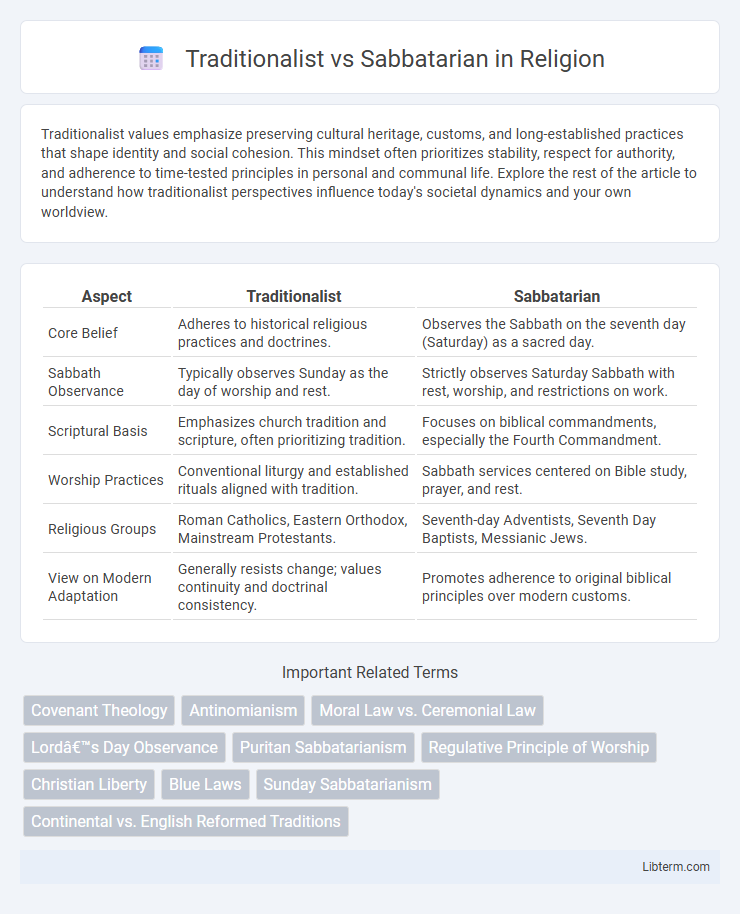Traditionalist values emphasize preserving cultural heritage, customs, and long-established practices that shape identity and social cohesion. This mindset often prioritizes stability, respect for authority, and adherence to time-tested principles in personal and communal life. Explore the rest of the article to understand how traditionalist perspectives influence today's societal dynamics and your own worldview.
Table of Comparison
| Aspect | Traditionalist | Sabbatarian |
|---|---|---|
| Core Belief | Adheres to historical religious practices and doctrines. | Observes the Sabbath on the seventh day (Saturday) as a sacred day. |
| Sabbath Observance | Typically observes Sunday as the day of worship and rest. | Strictly observes Saturday Sabbath with rest, worship, and restrictions on work. |
| Scriptural Basis | Emphasizes church tradition and scripture, often prioritizing tradition. | Focuses on biblical commandments, especially the Fourth Commandment. |
| Worship Practices | Conventional liturgy and established rituals aligned with tradition. | Sabbath services centered on Bible study, prayer, and rest. |
| Religious Groups | Roman Catholics, Eastern Orthodox, Mainstream Protestants. | Seventh-day Adventists, Seventh Day Baptists, Messianic Jews. |
| View on Modern Adaptation | Generally resists change; values continuity and doctrinal consistency. | Promotes adherence to original biblical principles over modern customs. |
Understanding Traditionalist and Sabbatarian Perspectives
Traditionalist perspectives emphasize observing the Sabbath on Sunday, viewing it as a continuation of the biblical command adapted by early Christians to commemorate Jesus Christ's resurrection. Sabbatarians strictly observe the Sabbath on Saturday, grounded in a literal interpretation of the Fourth Commandment and the belief that the seventh day remains the true day of rest and worship. Both perspectives reflect distinct theological interpretations of scripture regarding the Sabbath's timing and significance in Christian practice.
Historical Origins of Sunday Observance
The historical origins of Sunday observance trace back to early Christianity, where worship shifted from the Jewish Sabbath (Saturday) to Sunday, commemorating Jesus Christ's resurrection. Traditionalists often view Sunday observance as a distinct Christian practice developed in the Roman Empire, formalized by Emperor Constantine's Edict of 321 AD, which designated Sunday as a day of rest. Sabbatarians maintain adherence to the seventh-day Sabbath (Saturday), emphasizing biblical commandments and early Judeo-Christian customs predating Constantine's influence.
Key Beliefs of Traditionalist Christianity
Traditionalist Christianity upholds the observance of Sunday as the Lord's Day, emphasizing its significance based on Christ's resurrection. They interpret biblical commandments as fulfilled and transformed through Christ, rejecting the strict Sabbath rest laws found in Old Testament law. This belief contrasts with Sabbatarian Christians, who maintain Saturday Sabbath observance as a perpetual divine commandment.
The Sabbatarian Interpretation of Sabbath
The Sabbatarian interpretation of the Sabbath emphasizes strict observance of the seventh-day rest as prescribed in the Bible, typically Saturday, aligning with the Fourth Commandment in Exodus 20:8-11. Sabbatarians view the Sabbath as a lasting covenant between God and humanity, requiring cessation from secular work and a focus on worship and spiritual renewal. This interpretation contrasts with more traditionalist perspectives that may observe Sunday as the day of worship without the same legalistic adherence to rest.
Scriptural Foundations for Both Views
Traditionalist views on Sabbath observance emphasize the fulfillment of Old Testament laws through Christ, referencing passages like Colossians 2:16-17 and Hebrews 8:6-13 that highlight the new covenant's spiritual rest rather than a literal day of rest. Sabbatarians base their position on the Fourth Commandment (Exodus 20:8-11) and Jesus' own practice of Sabbath observance in the Gospels, arguing that the Sabbath remains a perpetual moral law requiring physical rest on the seventh day. Both perspectives seek to align Sabbath observance with biblical revelation, interpreting key texts within frameworks of continuity or discontinuity between Old and New Testament law.
Worship Practices: Sunday vs. Saturday
Traditionalist Christians predominantly observe Sunday as the day of worship, honoring it as the Lord's Day in commemoration of Jesus Christ's resurrection. Sabbatarians strictly observe Saturday, the seventh day of the week, adhering to biblical Sabbath commandments that emphasize rest and worship. The distinction underscores differing interpretations of scriptural mandates, influencing weekly worship patterns and liturgical customs within various Christian denominations.
Theological Debates Between the Groups
Theological debates between Traditionalists and Sabbatarians center on the interpretation of Sabbath observance in Christian life, with Traditionalists viewing it as a fulfilled Old Testament covenant and Sabbatarians asserting its continuing moral obligation. Traditionalists emphasize the New Testament teachings on rest through Christ, often citing Colossians 2:16-17, while Sabbatarians highlight Exodus 20:8-11 and reinforce the Sabbath as a perpetual commandment. These conflicting interpretations impact ecclesiology, soteriology, and Christian ethics in denominational doctrines.
Cultural and Regional Influences
Traditionalist and Sabbatarian views on Sabbath observance are deeply shaped by cultural and regional influences, with Traditionalists often rooted in Christian cultural contexts emphasizing Sunday worship as a symbol of Christ's resurrection. Sabbatarians, influenced by Jewish customs and regions with strong Seventh-day Adventist or Messianic Jewish communities, uphold Saturday as the biblical Sabbath based on Genesis and Fourth Commandment interpretations. These differences reflect historical, ethnic, and societal factors where denominational heritage and local religious traditions dictate Sabbath practices and theological emphasis.
Impact on Modern Christian Communities
Traditionalist and Sabbatarian beliefs shape modern Christian communities by influencing worship practices and weekly rhythms. Traditionalists often emphasize Sunday worship aligned with historical church customs, fostering unity through established liturgical patterns. Sabbatarians advocate for Saturday Sabbath observance, promoting rest and reflection that impacts community lifestyle and theological interpretations across denominations.
Navigating Differences: Toward Mutual Respect
Traditionalist and Sabbatarian views differ primarily on Sabbath observance, with Traditionalists often observing Sunday worship while Sabbatarians strictly adhere to Saturday as the Sabbath. Navigating these differences requires emphasizing shared beliefs in the importance of rest, worship, and community rather than focusing solely on the specific day. Mutual respect emerges through open dialogue and recognizing the historical and theological foundations that shape each perspective.
Traditionalist Infographic

 libterm.com
libterm.com